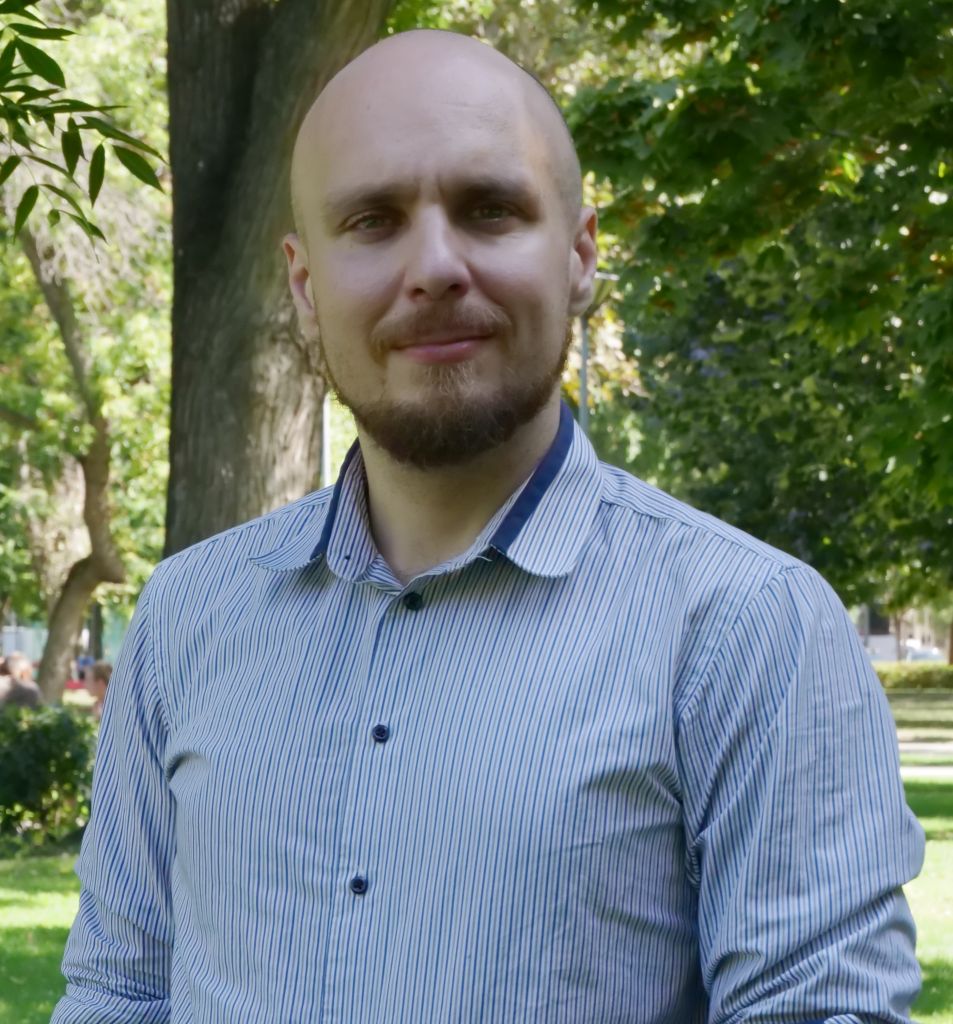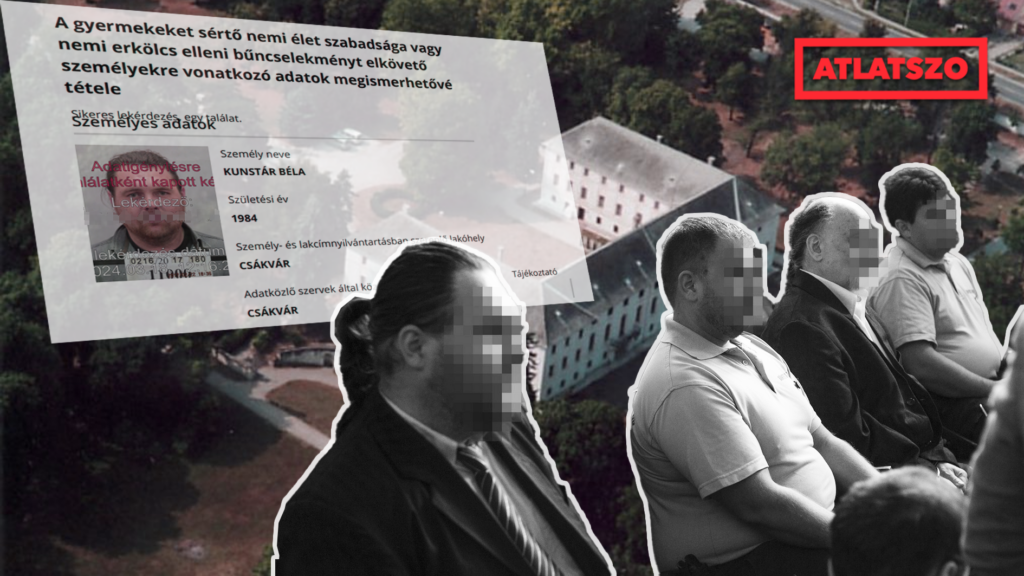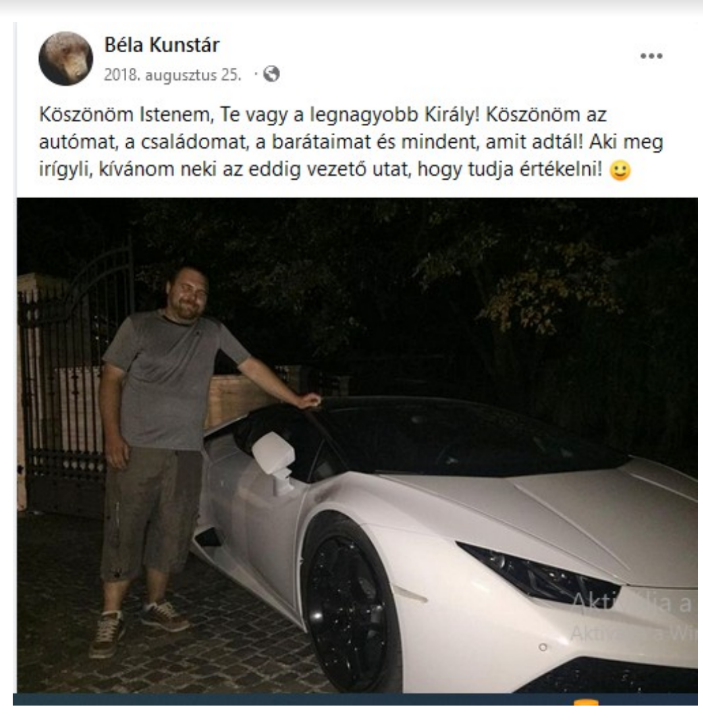The https://english.atlatszo.hu use cookies to track and profile customers such as action tags and pixel tracking on our website to assist our marketing. On our website we use technical, analytical, marketing and preference cookies. These are necessary for our site to work properly and to give us inforamation about how our site is used. See Cookies Policy
After being convicted for child molestation, former perpetrator appeared at a high-revenue company
Shortly after receiving an extremely light sentence for child sexual abuse in Bicske – the same scandal that led to the resignation of Hungary’s president –, a former employee made fortune with a newly created company, Átlátszó learned. Béla Kunstár has also been involved in a different company started by a nearby municipality, which later went to a manager in a company belonging to the oligarch Lőrinc Mészáros.
Between 2018 and 2019, three men were convicted for their involvement in the rampant sexual abuse of children in foster home of Bicske, a small town in mid-western Hungary. One of the men, Endre Kónya, who was sentenced for covering up the abuse, received a presidential pardon earlier this year – the resulting scandal led to the resignation of President Katalin Novák, who issued the pardon.

The main perpetrator, János Vásárhelyi served a prison sentence for sexual abuse – both he and Endre Kónya were reported mingling with various political figures before their sentencing. Mr. Vásárhelyi, for example, campaigned for the local Fidesz mayor (later MP), and both he and Endre Kónya worked with Győző Orbán Jr., the brother of Prime Minister Viktor Orbán, organizing children’s sporting events. As Átlátszó reported, online documents have been purged off the internet after the scandal broke out.
The third perpetrator, Béla Kunstár, received a 1.5-year suspended prison sentence, which was decried as extremely lenient by some of the victims. He was found guilty of abusing 4 minors aged 14 to 18, all living in the foster home. The court took into account as a mitigating circumstance that the acts were “consensual”, although it is questionable whether a child in such a subordinate situation can give meaningful consent.
Though not as widely covered by the media as the two other perpetrators, Béla Kunstár also appears to have had powerful connections, which helped him after the trial.
A surprising carreer
We have started our investigation with the then-public Facebook profile of Béla Kunstár Jr. (not to be confused with his father, also named Béla, who is a well-known teacher in the town of Csákvár and an elder of the Reformed Church), which was scrubbed of any references of his two-year term as an educator in the Bicske children’s home. However, comparing the photos on the page and the police registry of sex offenders, and contacting former foster home students, Átlátszó confirmed the identity of the convicted foster carer.
Kunstár listed his employers on his Facebook profile, including a company named Profit Partner Cooperative, which he worked for from 2017 to 2022.
According to company registries, the company was just created in late 2017, shortly before Kunstár was sentenced.
The company, registered in a town not far from Bicske, quickly generated significant revenues: in publicly available documents, the company reported over a billion HUFs of cash flow between 2018 and 2021. Béla Kunstár appears to have profited well personally: in a 2018 Facebook-photo, he is seen posing with a Lamborghini, which can worth up to a 100 million HUFs:
Shady dealings
Former residents of the Bicske children’s home told Átlátszó that Béla Kunstár was active in various businesses and often met with “people with nice cars” in Székesfehérvár, Csákvár and Slovakia. According to our sources, Kunstár has also tried to involve the students in his business: he has registered teenage children as student workers in several companies, who advertised products for him online. They said it was clear that Kunstar was treated as a “priority client” in the Bicske offices.
“At the government office and the employment center, we were allowed to go in out of turn when we had business with him,” one of them recalled.
They said there were also instances of him trying to get youths to sign company documents for him, including the legal ownership certificate of company with tax debt.
This practice is relevant when it comes to the aforementioned Profit Partner Cooperative.
The company is registered under the name of a young man, who was only 19 at the time of the company’s founding.
Former foster home students recognized him as someone who previously worked with Béla Kunstár, trying to convince them to invest their state-funded allowances in his real-estate business. He can also be seen alongside Kunstár in photos available on Facebook comfirming the connection.
This makes Profit Partner’s quick growth more suspicious. The cooperative has little to no online footprint, appearing only as a partner of a few local self-employed contractors. Despite this, the cooperative – ran supposedly by a 19-year-old, with involvement of a convicted felon – very quickly accumulated a billion HUF in revenue.
Revenues of companies tied to Mr. Kunstár.
According to a local councillor in Bicske, Kunstár, while not personally a supporter of the governing parties, is “pragmatic man” who tried to get along with influential figures, regardless of party affiliation. This is illustrated by his well-documented involvement with the municipality of the village of Pátka, prior to the child abuse scandal.
An oligarch connection
Béla Kunstár is listed as the former CEO of another cooperative named Művészellátó (‘Artists’s supplier’), which was previously named Pátka Market Cooperative. The company was originally started by the local government – Pátka mayor Dániel Nagy told to Átlátszó – and was initially led by Kunstár. He described the man as “perpetual motion type of person”, someone always involved in some business dealing – he was thus seen as ideal to head a cooperative aimed to support local small business owners.
After a few years, the local government stopped its involvement in the company;
after that, and following the Bicske trial, its revenue exploded, surpassing 125 million HUFs in 2019.
According to our sources, many business owners involved with the cooperative left in 2017, and would join the newly-created Profit Partner cooperative. The old company quickly rebranded as an artist supplier, retaining people involved in the music businesses (Béla Kunstár was himself a musician and had extensive contacts in this field).
However, the revenues of both companies after the Bicske trial surpass the revenues of the former Market cooperative. Adding to the suspicion of financial misconduct, the Market company, now Művészellátó did not report its revenues since 2021 (in this year they had a record-breaking 172 millions of HUFs), after which its tax ID was suspended, and it is currently under liquidation by the national tax agency.
In the last few years, the company changed hands a few times. Currently, it lists an Alcsútdoboz resident named Dániel Szabó as its managing director. Szabó also has connections to Bicske, and a LinkedIn profile lists him as the Strategic Development Manager of Radio Sales House Ltd.
Radio Sales House Kft. (RHS) is one of the older companies of Lőrinc Mészáros’, Hungary’s richest man and the main oligarch supporting Viktor Orbán’s government.
RSH is a joint subsidiary of Atmedia and HGY Invest. The former was owned by Tibor Krskó, a businessman close to the government, the latter by András Tombor, a creditor of Árpád Habony, owner of Mandiner, and later by Mészáros’ Opus Global Nyrt.
We contacted Béla Kunstár for answers, however, he deactivated his Facebook profile after receiving our message. Similarly, the young director of Profit Partner also refused to answer any questions. Dániel Szabó also responded to our questions by blocking our account.
Written and translated by Zalán Zubor. The Hungarian version of this story is here.
Share:
Your support matters. Your donation helps us to uncover the truth.
- PayPal
- Bank transfer
- Patreon
- Benevity
Support our work with a PayPal donation to the Átlátszónet Foundation! Thank you.
Support our work by bank transfer to the account of the Átlátszónet Foundation. Please add in the comments: “Donation”
Beneficiary: Átlátszónet Alapítvány, bank name and address: Raiffeisen Bank, H-1054 Budapest, Akadémia utca 6.
EUR: IBAN HU36 1201 1265 0142 5189 0040 0002
USD: IBAN HU36 1201 1265 0142 5189 0050 0009
HUF: IBAN HU78 1201 1265 0142 5189 0030 0005
SWIFT: UBRTHUHB
Be a follower on Patreon
Support us on Benevity!


